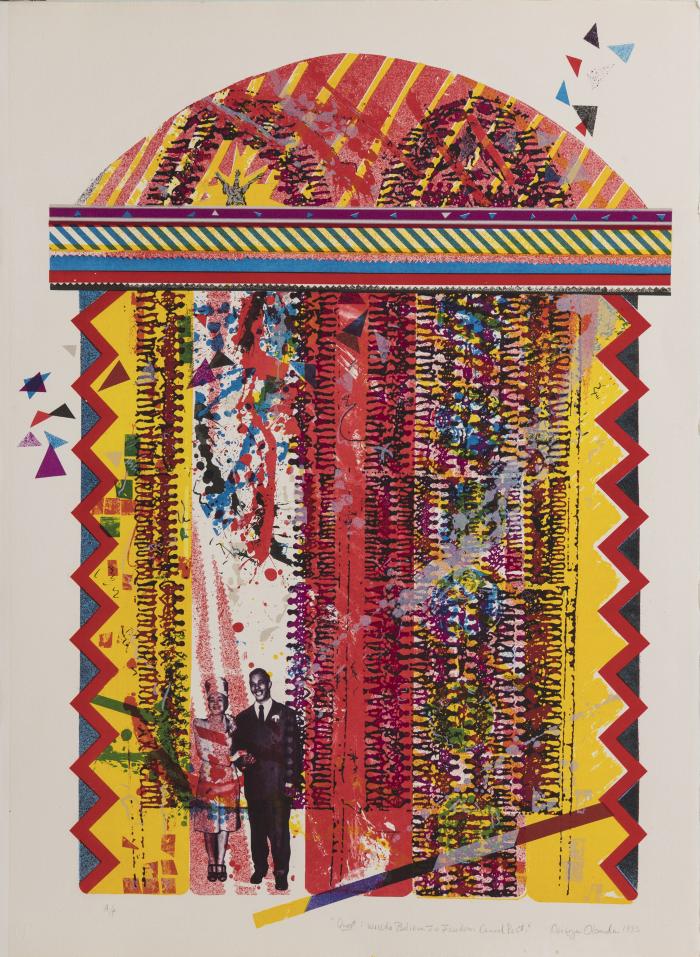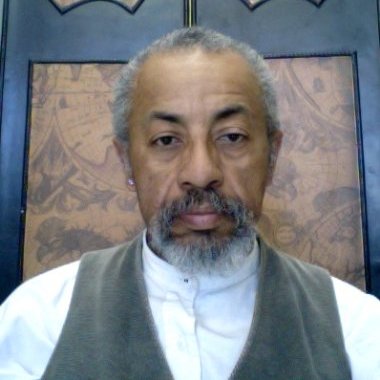
Quest: We Who Believe in Freedom Cannot Rest
Orisegun Bennett-Olomidun
- 1993
- Offset Lithograph
- Image/sheet: 30 x 22"
- 90 prints in this edition
About the Print
The print Quest: We Who Believe in Freedom Cannot Rest illustrates a couple in a doorway of a structure that is either a house or a building. A photographic image of a neatly dressed Black couple contrasts sharply with the expressionist renderings of the walls and roof of the building from which they emerge. The walls and roof seem to symbolize the outlines of an iconic 19th-century image depicting the Middle Passage, slaves stored in the holds of ships bringing Africans to the Americas. The title alludes to the role of the institution on Black marriages early on and its disruption and denial through the institution of slavery. The visual narrative suggests the nature and history of slavery and the quest by slaves and their descendants born into slavery for freedom to choose who to love, marry, bear children with, and raise a family. It would seem to urge Black family descendants to never forget the various dimensions of the quest for basic human rights denied and the legacy of slavery’s effect on the Black family.
—Allan L. Edmunds, 6-3-2021; from Brandywine Workshop and Archives records
The print, Quest: We Who Believe in Freedom Cannot Rest also employs illusion. The composition is of a couple in a doorway of a structure that is either a house or a building. A photographic image of a neatly dressed black couple contrasts sharply with the expressionist renderings of the walls and roof of the building from which they emerge. The viewer’s eye is drawn to the walls of the building because of the contrast in tone. On closer inspection, the walls and roof become the outlines of a famous 19th-century print depicting slaves stored in the holds of ships bringing black Africans to the New World. The title alludes to the struggle of African Americans’ quest for political and economic freedom. The print provides visual evidence of the nature and history of the struggle. The artist celebrates the legacy of the slaves, urges their descendants and us to never forget the reason for their struggle.
— From Brandywine Workshop and Archives records
About the Artist
Orisegun Bennett-Olomidun is a studio, public, and performing artist and educator whose work has been focused on the exploration of the essences of creativity; energy, spirit, power and aesthetics. He earned a BFA from the University of Cincinnati and the Ohio School of Design.
Bennett-Olomidun’s work has been exhibited at institutions including Artware, Museum of Science and Industry, and Isobel Neal Gallery, Chicago; Karamu House Gallery, Cleveland, OH; Art on the Square Gallery, Richmond, VA; University of Wisconsin, Madison; and Kent State University, OH.
Bennett-Olomidun is Artistic Director of Mojo Hand Studio, Richmond.
—From Brandywine Workshop and Archives records
Curriculum Connections
Suggested Topics for Expressive Writing
Expressive Writing
The writings of Haki R. Madhubuti reflect a similar way of stereotyping as the word-prints of Edgar Heap of Birds. People of African descent are disproportionately represented in entertainment—as dancers and singers, particularly—and in professional sports. They are perceived as physically strong and fast. In American society, Blacks may entertain, play sports — or cook and clean. Outside of those realms, however, Blacks both with and without advanced education, social prominence, and financial success are considered dangerous, therefore representing a threatening presence at both ends of the socioeconomic spectrum.
Our abilities as viewers to understand the messages and connections that the artists hope their imagery will convey is largely based on the extent of our own experiences and information that we bring to viewing and interpreting the artwork. In many countries, these types of messages are not brought to broad public attention and are often considered subversive.
Questions to Consider
- Why are some people considered a threat while others are not?
- Why is there education inequality in most developed countries?
- Who benefits from stereotyping others?
Related Media
- “America Calling” by Haki R. Madhubuti (Don L. Lee)
- “AWARENESS” by Haki R. Madhubuti (Don L. Lee)
- “Middle Passage” by Robert Hayden
- Amistad (1997 film) directed by Steven Spielberg
- Just Mercy (2019 film) directed and written by Destin Daniel Cretton
- King in the Wilderness (2018 documentary) directed by Peter W. Kunhardt
- Committed to Memory: The Art of the Slave Ship Icon by Cheryl Finley, PhD (2018)
